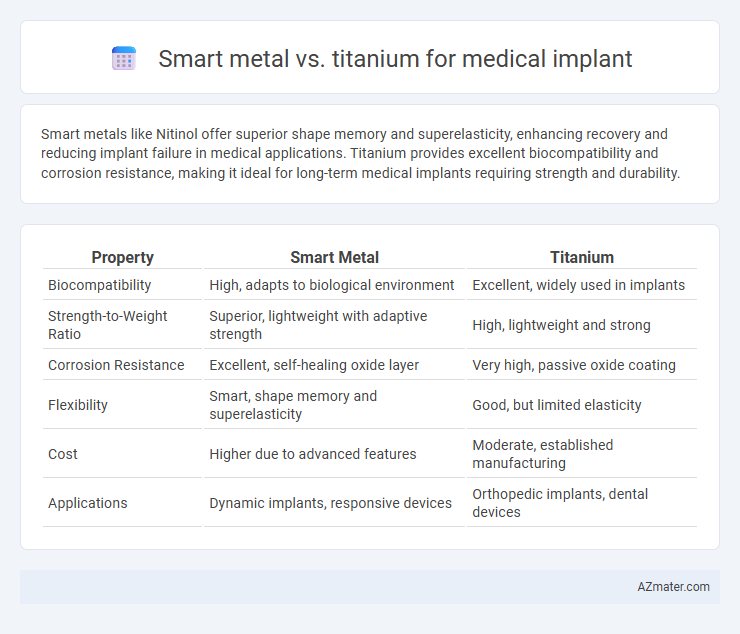Smart metals like Nitinol offer superior shape memory and superelasticity, enhancing recovery and reducing implant failure in medical applications. Titanium provides excellent biocompatibility and corrosion resistance, making it ideal for long-term medical implants requiring strength and durability.
Table of Comparison
| Property | Smart Metal | Titanium |
|---|---|---|
| Biocompatibility | High, adapts to biological environment | Excellent, widely used in implants |
| Strength-to-Weight Ratio | Superior, lightweight with adaptive strength | High, lightweight and strong |
| Corrosion Resistance | Excellent, self-healing oxide layer | Very high, passive oxide coating |
| Flexibility | Smart, shape memory and superelasticity | Good, but limited elasticity |
| Cost | Higher due to advanced features | Moderate, established manufacturing |
| Applications | Dynamic implants, responsive devices | Orthopedic implants, dental devices |
Understanding Smart Metals in Medical Implants
Smart metals, such as Nitinol, exhibit unique properties like shape memory and superelasticity, making them highly suitable for medical implants that require dynamic adaptability, such as stents and orthodontic devices. Titanium, known for its high strength-to-weight ratio, biocompatibility, and corrosion resistance, remains a standard material for permanent implants like joint replacements and bone plates. Understanding the functional advantages of smart metals enables innovations in minimally invasive procedures by offering flexibility and self-adjustment, whereas titanium provides long-term stability and structural support.
Titanium: The Gold Standard in Medical Devices
Titanium is the gold standard in medical implants due to its biocompatibility, corrosion resistance, and high strength-to-weight ratio, which ensure long-lasting performance inside the human body. Unlike smart metals such as Nitinol, titanium offers excellent osseointegration, promoting bone growth and implant stability. Its widespread use in orthopedic, dental, and cardiovascular devices highlights titanium's unmatched reliability and safety in medical applications.
Mechanical Strength: Smart Metal vs Titanium
Smart metals, such as Nitinol, exhibit superior mechanical strength due to their shape memory and superelastic properties, enabling high flexibility and durability under cyclic stress in medical implants. Titanium offers excellent tensile strength and corrosion resistance but lacks the adaptive deformation capabilities of smart metals, making it ideal for load-bearing implants requiring stability and biocompatibility. The choice between smart metal and titanium depends on application-specific mechanical requirements, with smart metals favored for dynamic environments and titanium preferred for static structural support.
Biocompatibility and Tissue Integration
Smart metals such as Nitinol exhibit exceptional biocompatibility and superior tissue integration due to their unique shape memory and superelastic properties, which reduce implant-related inflammation and promote faster healing. Titanium, widely used in medical implants, offers excellent biocompatibility and osseointegration, forming a strong bond with bone tissue to ensure long-term stability and durability. Advanced surface modifications on both smart metals and titanium further enhance cellular attachment, minimizing rejection risk and improving overall implant success.
Longevity and Corrosion Resistance Comparison
Smart metals like Nitinol exhibit exceptional shape memory and superelasticity, enhancing implant longevity through reduced mechanical stress and deformation. Titanium alloys are renowned for their superior corrosion resistance, forming a stable oxide layer that prevents degradation in the body's saline environment. Both materials ensure implant durability, but titanium's corrosion resistance offers a more stable long-term performance in medical applications.
Adaptability and Responsiveness in Implants
Smart metals like Nitinol exhibit exceptional adaptability and responsiveness in medical implants due to their shape memory and superelastic properties, allowing implants to adjust dynamically to physiological changes. Titanium, while biocompatible and corrosion-resistant, offers limited adaptability but ensures structural stability and integration with bone tissue. The unique phase transformation in smart metals enhances implant performance by reducing stress shielding and promoting better patient outcomes compared to traditional titanium implants.
Weight and Patient Comfort Considerations
Smart metals, such as Nitinol, offer exceptional flexibility and shape memory properties while maintaining a lower density compared to titanium, which weighs approximately 4.5 g/cm3. Titanium implants, with their high strength-to-weight ratio and density around 4.5 g/cm3, provide excellent durability but may be heavier than smart metal alternatives, potentially affecting patient comfort during prolonged use. The reduced weight of smart metal implants contributes to less pressure on surrounding tissues, enhancing patient comfort and facilitating better mobility post-surgery.
Customization and Manufacturing Techniques
Smart metals, such as shape memory alloys (e.g., Nitinol), offer superior customization for medical implants due to their unique properties like superelasticity and shape memory effect, enabling adaptive fits and minimally invasive delivery. Titanium, favored for its biocompatibility and strength, supports advanced manufacturing techniques including additive manufacturing (3D printing) to produce highly customized, patient-specific implants with complex geometries. Combining smart metals with precision manufacturing technologies enhances implant performance, promoting faster recovery and improved patient outcomes.
Cost Implications: Smart Metal vs Titanium
Smart metals, such as Nitinol, offer cost advantages over titanium implants due to their lower material and manufacturing expenses, which can reduce overall healthcare costs. Titanium, while more expensive, provides superior biocompatibility and corrosion resistance, justifying its higher price in critical implant applications. The choice between smart metals and titanium implants often hinges on balancing upfront costs with long-term durability and patient outcomes.
Future Prospects in Medical Implant Materials
Smart metals, such as shape memory alloys like Nitinol, offer unique properties including superelasticity and biocompatibility that enhance implant adaptability and patient comfort. Titanium remains a gold standard due to its exceptional strength-to-weight ratio, corrosion resistance, and osseointegration capabilities, making it ideal for long-term implantation. Future prospects emphasize hybrid materials combining smart metals' responsiveness with titanium's durability, driving innovations in personalized, durable, and minimally invasive medical implants.

Infographic: Smart metal vs Titanium for Medical implant
 azmater.com
azmater.com